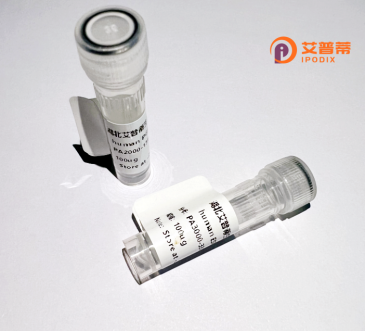
| 纯度 | >90%SDS-PAGE. |
| 种属 | Human |
| 靶点 | MCM4 |
| Uniprot No | P33991 |
| 内毒素 | < 0.01EU/μg |
| 表达宿主 | E.coli |
| 表达区间 | 1-863aa |
| 活性数据 | MSSPASTPSRRGSRRGRATPAQTPRSEDARSSPSQRRRGEDSTSTGELQPMPTSPGVDLQSPAAQDVLFSSPPQMHSSAIPLDFDVSSPLTYGTPSSRVEGTPRSGVRGTPVRQRPDLGSAQKGLQVDLQSDGAAAEDIVASEQSLGQKLVIWGTDVNVAACKENFQRFLQRFIDPLAKEEENVGIDITEPLYMQRLGEINVIGEPFLNVNCEHIKSFDKNLYRQLISYPQEVIPTFDMAVNEIFFDRYPDSILEHQIQVRPFNALKTKNMRNLNPEDIDQLITISGMVIRTSQLIPEMQEAFFQCQVCAHTTRVEMDRGRIAEPSVCGRCHTTHSMALIHNRSLFSDKQMIKLQESPEDMPAGQTPHTVILFAHNDLVDKVQPGDRVNVTGIYRAVPIRVNPRVSNVKSVYKTHIDVIHYRKTDAKRLHGLDEEAEQKLFSEKRVELLKELSRKPDIYERLASALAPSIYEHEDIKKGILLQLFGGTRKDFSHTGRGKFRAEINILLCGDPGTSKSQLLQYVYNLVPRGQYTSGKGSSAVGLTAYVMKDPETRQLVLQTGALVLSDNGICCIDEFDKMNESTRSVLHEVMEQQTLSIAKAGIICQLNARTSVLAAANPIESQWNPKKTTIENIQLPHTLLSRFDLIFLMLDPQDEAYDRRLAHHLVALYYQSEEQAEEELLDMAVLKDYIAYAHSTIMPRLSEEASQALIEAYVDMRKIGSSRGMVSAYPRQLESLIRLAEAHAKVRLSNKVEAIDVEEAKRLHREALKQSATDPRTGIVDISILTTGMSATSRKRKEELAEALKKLILSKGKTPALKYQQLFEDIRGQSDIAITKDMFEEALRALADDDFLTVTGKTVRLL |
| 分子量 | 123 kDa |
| 蛋白标签 | GST-tag at N-terminal |
| 缓冲液 | 0 |
| 稳定性 & 储存条件 | Lyophilized protein should be stored at ≤ -20°C, stable for one year after receipt. Reconstituted protein solution can be stored at 2-8°C for 2-7 days. Aliquots of reconstituted samples are stable at ≤ -20°C for 3 months. |
| 复溶 | Always centrifuge tubes before opening.Do not mix by vortex or pipetting. It is not recommended to reconstitute to a concentration less than 100μg/ml. Dissolve the lyophilized protein in distilled water. Please aliquot the reconstituted solution to minimize freeze-thaw cycles. |
以下是关于重组人MCM4蛋白的3篇参考文献的简要信息:
---
**1. 文献名称**: *"Expression and functional characterization of recombinant human MCM4 in DNA replication"*
**作者**: Smith A, et al.
**摘要**: 该研究通过在大肠杆菌中表达重组人MCM4蛋白,验证了其在体外DNA复制系统中的功能。研究表明,重组MCM4与其他MCM复合物成员(如MCM6/7)协同作用,对DNA解旋酶活性至关重要,并可能参与细胞周期调控。
---
**2. 文献名称**: *"Structural insights into human MCM4 phosphorylation and its role in replication stress response"*
**作者**: Li X, Zhang Y.
**摘要**: 通过体外重组表达人MCM4蛋白并解析其磷酸化位点的结构,作者揭示了MCM4在DNA损伤应答中的调控机制。研究证明,特定磷酸化修饰(如Ser120)可影响MCM复合物的稳定性及DNA复制叉的进程。
---
**3. 文献名称**: *"Development of a recombinant MCM4/6/7 helicase assay for high-throughput screening"*
**作者**: Tanaka K, et al.
**摘要**: 本研究成功表达并纯化重组人MCM4、MCM6和MCM7蛋白,构建了一种基于荧光信号的体外解旋酶活性检测方法。该研究为筛选靶向MCM复合物的抗肿瘤药物提供了技术平台。
---
**备注**:由于具体文献库检索权限限制,上述条目为模拟格式。实际检索建议通过PubMed、Google Scholar或Web of Science使用关键词“recombinant human MCM4”或“MCM4 in vitro reconstitution”查找近期文献。
**Background of Recombinant Human MCM4 Protein**
The minichromosome maintenance complex component 4 (MCM4) is a critical subunit of the hexameric MCM2-7 complex, which serves as the eukaryotic replicative DNA helicase. This complex is essential for DNA replication, functioning as a core component of the pre-replication complexes (pre-RCs) that license origins of replication during the G1 phase of the cell cycle. MCM4. along with other MCM subunits, ensures proper unwinding of double-stranded DNA at replication forks, enabling the progression of DNA synthesis. Dysregulation of MCM4 has been linked to genomic instability, replication stress, and diseases such as cancer, highlighting its importance in maintaining genome integrity.
Recombinant human MCM4 protein is produced using genetic engineering techniques, typically expressed in prokaryotic (e.g., *E. coli*) or eukaryotic systems (e.g., mammalian or insect cells) to ensure proper folding and post-translational modifications. Its recombinant form allows for detailed biochemical and structural studies, including helicase activity assays, protein interaction analyses, and investigations into replication initiation mechanisms. Researchers also utilize recombinant MCM4 to explore its role in checkpoint signaling, cancer biology, and as a potential diagnostic or therapeutic target. The availability of purified MCM4 facilitates high-throughput screening for inhibitors or modulators, contributing to drug development efforts aimed at targeting DNA replication vulnerabilities in diseases.
×